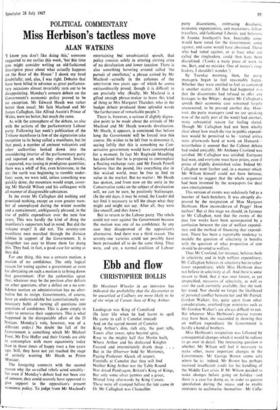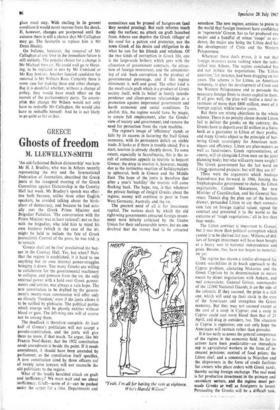Miss Herbison's tactless move
POLITICAL COMMENTARY ALAN WATKINS
know you don't like doing this,' someone suggested to me earlier this week, 'but this time you might consider writing an old-fashioned descriptive piece about what actually happens on the floor of the House.' I shook my head doubtfully; and, alas, I was right. Debates that have been billed in advance as great parliamen- tary occasions almost invariably turn out to be disappointing. Monday's censure debate on the Government's economic policy proved to be no exception. Mr Edward Heath was rather better than usual; Mr Iain Macleod and Mr James Callaghan, like Alfred Austin's Prince of Wales, were no better, but much the same.
As with the atmosphere of the debate, so also with the actions of the parliamentary Labour party. Following last week's publication of the Tribune manifesto (a few of the signatories take exception to its being called a manifesto, but let that pass), a number of eminent volcanists and other authorities looked down into the smouldering interior of the parliamentary party and reported on what they observed. Smoke, it appeared, was issuing in prodigious quantities; there was a whiff of fire, even brimstone, in the air; the earth was beginning to tremble under- foot; soon, we were told, unless something was quickly done, the-mountain would erupt, cover- ing Mr Harold Wilson and his colleagues with all manner of disagreeable substances.
In the event Mr Callaghan did nothing and promised nothing, except an even greater num- ber of unemployed during the winter months and a containment, ambiguously phrased, in the rise of public expenditure over the next few years. This was hardly the kind of thing the manifesto's supporters had in mind. But did the volcano erupt? It did not. The seventy-one manifesto men marched through the division lobbies in support of the Goverment. It is altogether too easy to blame them for doing this. They had, in faot, a good case for acting as they did.
For one thing, this was a censure motion, a motion of no confidence. The only logical reason for voting against a government or even for abstaining on such a motion is to bring down that government. (For the authorities agree that, whatever may be the position after defeats on other questions, after a defeat on a no con- fidence motion an administration has no alter- native but to resign. Governments, of course, have an understandable but constitutionally un- necessary habit of turning all questions into questions of confidence. This is done simply in order to terrorise their supporters. This is what happened in the disreputable affair of the D Notices. Monday's vote, however, was of a different order.) No doubt the fall of the Government is something which Mr Michael Foot, Mr Eric Heller and their friends are able to contemplate with more equanimity today than in those times of happy trust a few years' ago. Still, they have not yet reached the stage of actively wanting Mr Heath as Prime Minister.
The foregoing connects with the second reason why the so-called rebels acted sensibly: for even if Monday's debate had not been one of censure, they could scarcely have appeared to give support to the opposition's present economic policy. To judge from Mr Ylacleod's
entertaining but unsubstantial speech, that policy consists solely in uttering stirring cries of no devaluation and lower taxation. There is also something hovering around called 'the pursuit of excellence,' a phrase coined by Mr Macleod—actually in the columns of the SPECTATOR two years ago—of which he seems extraordinarily proud, though it is difficult to see precisely why. (Really, Mr Macleod is a gifted enough phrase-maker to leave this kind of thing to Mrs Margaret Thatcher, who in the budget debate produced those splendid words `the furtherance of remarkable people.')
There is, however, a serious if slightly digres- sive point to be made about the attitude of Mr Macleod and Mr Heath towards devaluation. Mr Heath, it appears, is convinced that before long the Government will be forced into this course. He wishes to be left free to denounce it, saying loftily that this is something no Con- servative government would have contemplated for a moment. In fact Mr Reginald Maudling has declared that he is prepared to contemplate a floating exchange rate; and Mr Enoch Powell believes that the pound, like everything else in this wicked world, must be free to find its value in the market. But no matter: Mr Heath has spoken, and from now on the unity in the Conservative ranks on the subject of devaluation will, we can be sure, be positively Stalinesque. (In the old days, it may be noted, the Leader did not find it necessary to tell the chaps what they might and might not say. After all, they were like oneself, and they knew.) But to return to the Labour party. The rebels could not vote against the Government because the motion was one of no confidence. In any case they disapproved of the opposition's alternative. And there was a third reason. The seventy-one varieties could not possibly have been persuaded all to do the same thing. They were, and are, a normal coalition of Labour
party dissentients, embracing devaluers, economic expansionists, anti-marketeers, fellow travellers, old-fashioned Liberals and believers in Joanna Southcott's box. Inevitably some would have voted for the Government. some against, and some would have abstained. Those who had voted against, or at least what are called the ringleaders, could then have been disciplined. (looks a nasty piece of work to me, Bert,-and no mistake. One of nature's ring- leaders, I .shouldn't wonder.') By Tuesday morning, then, the party managers began to feel reasonably happy. Whether they were entitled to feel so contented is another matter. All that had happened v■ is that the dissentients had refused to offer any hostages to the Whips : despite Mr Callaghan's speech their economic case remained largely unanswered, to be pressed another day. How- ever,-the party managers (and we are speaking now of the early part of the week) had another, more substantial reason for feeling elated. Though Mr Callaghan had not been wholly clear about how much the rise in public expendi- ture would be permitted to be—textual critics were afterwards hard at work on Hansard— nevertheless it seemed that the Cabinet debate had ended amicably. Mr Anthony Crosland was satisfied. Mr Callaghan was satisfied. Everyone bad won, and everyone must have prizes, even if prizes of slightly diminished value. Indeed Mr Callaghan went further and, in a manner which Mr Wilson himself could not have bettered, contrived to suggest that the whole argument had been invented by the newpapers for their own entertainment.
This version of events was sedulously fed to a number of back-benchers. It was abruptly dis- proved by the resignation of Miss Margaret Herbison. How inconsiderate of Peggy! How tactless! But at this stage we should, in fairness to Mr Callaghan, note that the events of the past few weeks have been accompanied by a confusion between the size of welfare expendi- ture and the method of financing that expendi- ture. There has been a regrettable tendency to muddle the question of selectivity in benefits with the question of what proportion of GNP should be devoted to welfare.
Thus Mr Crosland, for instance, believes both in selectivity and in high welfare expenditure; Mr Callaghan believes in selectivity but in rather lower expenditure; while Miss Herbison does not believe in selectivity at all. And there is some reason to think that it was over future, as yet unspecified, measures of selectivity, as well as over the cash currently available, that she took her stand. Nor should we forget the likelihood of personal conflict between her and Mr Patrick Gordon Walker; for, quite apart from other considerations, overlord-type ministries such as Mr Gordon Walker's are always difficult to run. But whatever Miss Herbison's precise reasons may have been, she succeeded in showing that on welfare expenditure the Government is hardly a band of brothers.
Miss Herbison's resignation was followed by consequential changes which it would be tedious to go over in detail. The interesting question is whether Mr Wilson will feel it necessary to make other, more important changes in the Government. Mr George Brown seems safe where he is: indeed, Mr Brown has perhaps received insufficient credit for his handling of the Middle East crisis. If Mr Wilson decided to make changes before going on holiday—and there is a case for doing so, in order to quieten speculation during the recess and to enable ministers to acclimatise themselves—Mr Calla-
ghan must stay. With sterling in its present condition it would never recover from the shock. If, however, changes are postponed until the autumn there is still a chance that Mr Callaghan may go. The favourite to replace him is Mr Denis Healey.
On balance, however, the removal of Mr Callaghan at any time in the immediate future is still unlikely. The popular choice for a change is Mr Michael Stew art. He could well go to Hous- ing, to be replaced at DEA by Mr Crosland or Mr Roy Jenkins. Another fancied candidate for removal is Mr William Ross. Certainly there is some case for making these and other changes. But it is doubtful whether, without a change of policy, they would have much effect on the morale of the parliamentary party. To accom- plish this change Mr Wilson would not only have to reshuffle Mr Callaghan. He would also have to reshuffle himself. And he is not likely to go quite as far as that.































 Previous page
Previous page